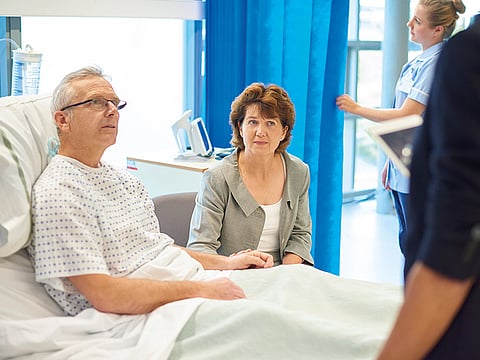The post-operative world
Cardiac care has some of its finest and most crucial moments after a surgery is complete, as leading local specialists explain

While events that occur inside an operating room are what determine the success of a cardiac surgery, it is effective post-operative management that makes or mars successful recovery.
With multiple components addressing the patient’s cardiovascular, respiratory, renal, gastrointestinal and neuropsychiatric systems, post-operative care is important, imperative and impactful in equal measure.
“An expert post-operative approach is so important in ensuring successful outcome, it should be and is provided, every hour of the day,” says Dr Tamer Taha Ismail, Consultant Cardiologist at Medcare Hospital Sharjah.
Components that make a whole
Dr Masakazu Nakao, Head of the Heart Centre of Excellence, Al Jalila Children’s Specialty Hospital, says post-operative care is of equal importance to diagnosis, preoperative management and surgery in determining the success of every cardiac surgery. “Immediate post-operative care within 24 to 48 hours from surgery is particularly important because surgery always poses harm for the body, unless there are more benefits to achieve. While all cardiac patients need stability and support to recover, children need it more.”
Dr Allam Al Kowatli, Consultant Interventional Cardiologist at Emirates Hospital Jumeirah, explains how post-operative cardiac care can help prevent potential complications and identify unfavourable trends during recovery: “While all components of post-operative care are essential, we have observed that not paying enough attention to patient hemodynamic (vitals and well-being), urine output and response to commands can lead to bad consequences and worse outcomes — irrespective of how [well] the surgery went.”
Dr Sam Haydar, Consultant Cardiothoracic Surgeon at Mediclinic City Hospital, lists the many reasons for close monitoring after a cardiac surgery: organ function, surgical wounds, excessive bleeding, temporary pacemakers and special drugs. He stresses that mechanical ventilation remains the most delicate area, which requires special expertise and meticulous operation.
Specialisations
Mediclinic City Hospital is one of the UAE’s only hospitals to offer endoscopic vascular harvesting, a procedure that greatly reduces recovery time after coronary artery bypass surgery.
Dubai Hospital has for more than 25 years run a renowned cardiothoracic surgery with a state-of-art surgical intensive care unit, and it is this department that pioneered the extracorporeal membrane oxygenator (ECMO) programme in the UAE.
“Since its very start, many patients with critical cardiac and or pulmonary conditions were saved using the ECMO device,” says Dr Aseem Pawar, Specialist Registrar, Dubai Hospital. “We are also a referral centre for the entire country for ECMO.”
Dr Pawar also explains the role it plays in recovery. “ECMOs are machines that are connected to the heart that substitute its functioning and thereby gives it rest for a few days, until the heart recovers or other higher management options are employed.”
The Heart Centre of Excellence is Dubai’s only facility that specialises in diagnostic and treatments in cardiology and cardiac surgery for children. “We already have a paediatric cardiac ICU and physiotherapy for post-operative recovery,” says Dr Nakao. “In the near future, we also plan to have Cardiac Step Down Care for our young patients.”
Advancements
Dr Al Kowatli outlines new developments in the field: “Post-operative pain relief is one of the cornerstones of the success of any surgery, and newer introductions are not only efficient but also easier to manage.
“Other recent developments include early extubation from ventilators, early mobilisation, and cardiac rehabilitation.”
Meanwhile, Dr Ismail advocates the use of evidence-based multimodal analgesia over traditional opiates. “Opiates have undesirable dose-related side effects such as nausea, constipation, vomiting, dizziness, mental confusion and respiratory depression, all of which substantially influence patient recovery and may delay discharge.”
Dr Haydar praises the contribution of medical informatics — the intersection of information sciences, computer technology and healthcare. “Cardiovascular and respiratory monitoring devices continue to improve, and today’s biosensors can quickly and accurately detect variables in the bloodstream, airways or operating machines. ”
However, the biggest advances are in the domain of cardiorespiratory support such as ECMO and left ventricle assist devices, he says. “These life support systems keep critically ill patients alive while waiting for their failing heart or lungs to recover.”


